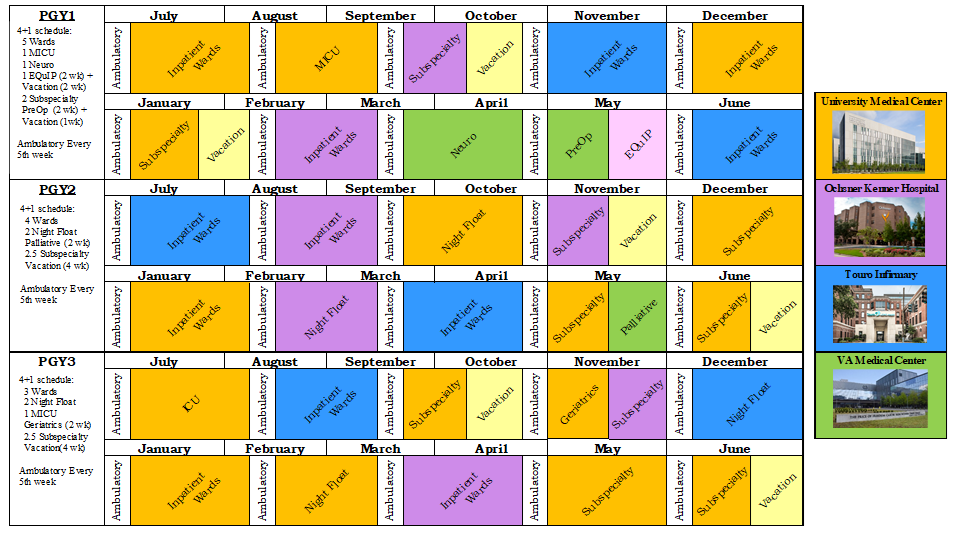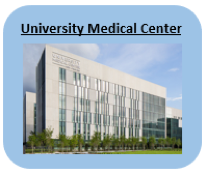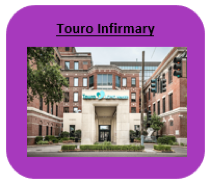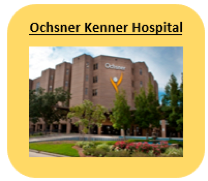Prospective students
The Internal Medicine – New Orleans Residency Program serves a diverse group of patients with a wide range of medical and social issues. Residents in our program experience pathology that others can only read about in textbooks. At University Medical Center, we typically see underinsured and underserved patients, while at Touro Infirmary and Ochsner Medical Center-Kenner, we care for a mix of private, insured and uninsured patients. Click the videos below to hear from our residents about a typical day at each rotation site.
A DAY IN THE LIFE
University Medical Center
University Medical Center New Orleans (UMCNO) became our primary teaching hospital in August 2015, when the program relocated to this state-of-the-art, $1.3 billion facility. UMCNO is a 446-bed hospital that serves as a Level I Trauma Center and regional Burn Center, located directly across the street from the LSUHSC campus in downtown New Orleans.
Residents rotate on inpatient ward services in teams of three (one senior resident with two interns), with admissions occurring every fifth night. Subspecialty rotations available at UMCNO include Gastroenterology, Nephrology, Rheumatology, Endocrinology, Infectious Diseases, Pulmonary, Hematology/Oncology, Palliative Medicine, and Cardiology. UMCNO also serves as the primary site for our outpatient continuity clinics, structured in the X+Y format, and categorical residents rotate through the closed, Medical ICU, ensuring a strong foundation in the care of critically ill patients. Educational activities include Noon Report (Monday–Thursday) and Medicine Grand Rounds (Friday).
The patient population at UMCNO is largely composed of individuals of lower socioeconomic status, with many patients being uninsured or Medicaid-covered, and a significant portion facing barriers such as limited health literacy. This provides residents with the opportunity to care for a vulnerable and underserved community, making their training especially meaningful. Patients benefit from resources such as 340B drug pricing, free care services, and Spirit of Charity donation funds, which help provide access to treatments that may otherwise be unavailable in other hospital systems.
UMCNO offers residents the chance to combine advanced medical training with a mission-driven commitment to serving the community—truly allowing them to make a difference in the lives of their patients.
Touro Infirmary
Touro Infirmary is the oldest operating hospital in the uptown area of New Orleans, established in 1852, and serves as a important training site for our residents since the closure of Charity Hospital after Hurricane Katrina. At Touro, LSU residents manage a Medicine service caring primarily for self-pay, Medicaid, and Medicare patients. This rotation provides residents with valuable experience outside the academic-based system, offering a true community hospital perspective.
On average, just over five patients are admitted per 24-hour period, allowing for meaningful clinical exposure while maintaining a balanced workload. Touro has an “open” ICU policy. Residents work closely with LSU faculty while rotating at this site and attend daily Morning Reports facilitated by faculty. Subspecialty care at Touro is provided by non-academic physicians, giving residents a clear picture of how hospital medicine is practiced in the private sector.
Ochsner Kenner Medical Center
Ochsner Medical Center – Kenner is a private institution where our LSU Hospitalist Medicine Group admits both Medicare and privately insured patients located minutes from the airport in the suburbs of New Orleans. Rotations at this site provide residents with valuable insight into how medicine is practiced in a community hospital setting with a patient population more representative of privately insured individuals. Care is delivered in close collaboration with social workers and case managers, ensuring a multidisciplinary and interprofessional approach to patient management.
On average, just over five patients are admitted per 24-hour period, allowing residents to gain meaningful exposure while maintaining an appropriate balance of responsibility. Like Touro, Kenner operates under an “open” ICU policy, further broadening residents’ experience. Available subspecialty rotations include Infectious Diseases, Gastroenterology, Pulmonology, and Nephrology. Additionally, Morning Report is held daily, fostering consistent case-based learning and discussion.
A Year at a Glance
Categorical Residents: Three Years at a Glance
Categorical Residents: Three Years at a Glance
The Categorical Internal Medicine Residency at LSU provides residents with a comprehensive educational experience designed to prepare them for the demands of professional practice. Over the course of three years, residents gain exposure to a broad range of clinical experiences in both inpatient and outpatient settings, with progressive levels of autonomy to foster independence and confidence. In addition, residents are given the opportunity to provide input on their rotations, allowing them to tailor aspects of their training to align with their individual career goals and interests.
A sample three year schedule:




Preliminary Residents: Year at a Glance
Admit Schedule
Our program follows the X+Y scheduling model, consisting of four weeks on inpatient or elective rotations followed by one dedicated week of clinic. Each rotation block concludes on a Sunday and is immediately followed by a clinic week, with continuity clinic in the mornings and subspecialty clinics in the afternoons. After clinic week, residents are provided a built-in “golden weekend” off before starting their next rotation on Monday. The schedule is organized into five cohort groups, with each cohort rotating through clinic every five weeks.
Inpatient Admit Schedule
Kenner and Touro Hospitals utilize a two-team system. Each team is composed of two residents and two interns under the supervision of an attending physician. Each attending team is further divided into pairs (one resident and one intern). Admissions follow a traditional every-fourth-night call system, with the admitting resident and intern signing out at 9:00 PM to the night float resident. Both hospitals operate with open ICUs, allowing residents to manage a broad range of critically ill patients in collaboration with the ICU teams. Admissions at these facilities typically average just over 5 admissions in a 24-hour period.
University Medical Center (UMC) functions with five admitting teams and one dedicated consult/step-down resident. Each admitting team includes one resident and two interns per attending. Admission days are structured on a traditional every-fifth-night schedule. Admit teams (resident and day intern) remain until 7:00 PM, when the night float resident and night intern assume responsibilities. Admissions at this facility typically average just under 10 admissions in a 24-hour period.
The step-down/consult resident does not participate in the admission schedule. Instead, this resident manages step-down patients from the closed ICU and general medicine consults from non-medicine services, which are evenly distributed among the admitting teams. Step-down admissions are accepted until 3:00 PM, after which responsibility transitions to the admit team or the private hospitalist group.
The UMC Medical ICU is a closed unit with five teams, two of which are staffed by residents from our program. Each team consists of one resident and one to two interns per attending. Call is scheduled every fourth night, with the admitting team signing out to the night float team at 7:00 PM.
Our program provides experience in the traditional overnight-call system as well as the night float system. This allows residents to adapt their behaviors to fit each system, ensuring that residents will feel comfortable with whatever type of call used by the practice they enter into after graduation.
LSUHSC Community Engagement
As an institution of higher learning, LSUHSC embraces a culture where everyone works for the betterment of the individual and community. Leadership, faculty, staff, and learner educational experience enables us to better address healthcare inequities and cultural competency in clinical care. The welcoming community and patient population that LSUHSC fosters trainees' understanding and effective delivery of care to individuals of unique backgrounds, which is integral to the institution's academic mission. As a community, LSUHSC embraces the full range of human difference.
To demonstrate LSU's commitment to community and institutional values, an Assistant Vice Chancellor for Office of Community Engagement is charged with creating programs for successful recruitment and retention of faculty, staff, and students from all communities to foster excellence in research, education, patient care and community service.
Specifically, the School of Medicine's Office of Community Engagement has a series to develop awareness, literacy and acknowledgement of the structural frameworks which intersect in the space health care inequities, and disparities.
LSUHSC New Orleans welcomes, needs, and celebrates its strong voices. Our training program is our present and future and serves a beautiful community. We are committed to a welcoming, vibrant training experience, and to learning how to care more completely for each other and our patients.
Wellness
Program Wellness Activities and Initiatives
A second-year resident has assumed the role of the Wellness Ambassador for the Internal Medicine Residency Program. In cooperation with other residents, he enthusiastically plans and executes several wellness (social) events throughout the year, such as resident pool parties, “escape rooms” (live-action, immersive, team-based games/adventures), happy hours and New Orleans Saints game-day watch parties. Invitations are always extended to residents’ spouses, significant others, and children.
UMCNO Academic Affairs and the B Well Program, UMCNO’s Well-Being Program, offer Wellness Wednesdays throughout the year. An example includes “Lean on Me” Lunch and Learn, with lunch provided, where health programs from UMC (ComPsych) discussed initiatives and services that are offered relating to mental health and well-being. In addition, LSUHSC hosts several seminars throughout the year, such as “Mindfulness in Wellness and Illness”. Residents are highly encouraged to participate in these events.
For physical wellness, residents have free access to LSUHSC's Wellness Center. The Wellness Center is dedicated to promoting the health and well-being of all members of the LSUHSC community in a safe and educational environment. The Wellness Center offers early morning, evening, and Saturday hours of operation to accommodate varying work schedules.
There is a Wellness Committee at LSUHSC (LSU Wellness Krewe). The goal of the committee is to promote a healthy learning and working environment and build resiliency and personal well-being among faculty, staff, residents, and students at LSUHSC. The Wellness Committee has created a very robust website that offers information on emotional well-being, including information on stress, depression, and mindfulness, as well as alcohol use, suicide, PTSD, work-life balance, and other resources that are helpful for our working community.
The Chairman of the Internal Medicine Department hosts several social events throughout the year, including a Chief Resident Party in the spring, a Resident Barbeque in the summer, and a Holiday Party in December. The Program Director also hosts a Holiday Party in December. These social events allow for resident camaraderie to be enhanced in a setting away from the work environment.

